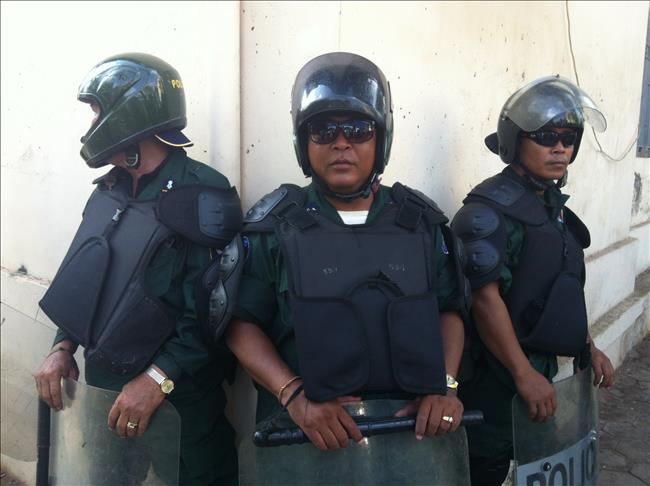
By Kate Bartlett
PHNOM PENH
A Phnom Penh court Friday convicted 13 people of plotting to overthrow long-ruling Prime Minister Hun Sen and his government, allegations Human Rights Watch said were “concocted” and aimed at weakening the country’s political opposition.
The men from a group known as the Khmer National Liberation Front (KNLF), were handed sentences of between five and nine years, despite what critics said was a complete lack of evidence presented during their one-day trial in February.
Seven men were arrested in Thailand in March last year and handed over to Cambodian authorities who accused them of "terrorism" and trying to organize an armed insurrection against the state. The other six were later charged and tried in absentia.
The arrests came shortly before national elections in July that were the most hotly contested in years, with Hun Sen’s ruling Cambodian People’s Party retaining control but the opposition Cambodia National Rescue Party (CNRP) alleging widespread fraud and calling for a re-vote.
Human Rights Watch has said the charges against the group were spurious and meant to discredit the opposition.
“Prime Minister Hun Sen announced before last July’s elections that a plot to violently overthrow the government had been broken up, seemingly intending to tar the opposition with the brush of violent extremism,” said Brad Adams, Asia director at Human Rights Watch.
“The evidence presented in court makes clear this plot was concocted.”
Among the evidence presented at the one-day trial were leaflets opposing the government, but not advocating violence; a police interview with one KNLF member about procuring weapons - which he retracted in court saying it was conducted under coercion; and a photograph of another KNLF member in a military uniform bearing a Thai flag.
“The conviction of any of these 13 defendants will not be proof of guilt but rather of Hun Sen’s control over Cambodia’s courts to weaken the opposition with false accusations,” Adams said ahead of the verdict.
“No one should be sentenced to prison to serve Hun Sen’s political agenda.”
The KNLF, whose president Sam Serey resides in Denmark, was formed in 2012, according to its website, to “seek justice for, free the Cambodian people from the Vietnamese neo-colony and dictatorship regime under Hun Sen.”
It states: “The Khmer National Liberation Front does not recognize the present government led by the Cambodian People’s Party and the dictator Hun Sen,” adding that the group believes Hun Sen to be a Communist and puppet of Vietnam — the country which initially installed him in power after the fall of the Khmer Rouge regime.
The website does not, however, mention violent struggle.
After the arrests of seven of the 13 men last year, Hun Sen told an election campaign rally that “terrorists” were hiding in the opposition CNRP and that people with links to the KNLF within the CNRP could also face arrest.
Since July’s ballot, the CNRP has been holding regular peaceful mass demonstrations calling for a re-vote and has refused to take up its seats in parliament.
However, this is not the first case where the Hun Sen government has accused little-known groups of terrorism and rushed through trials with scant evidence—with some analysts saying it is one of the premier’s means of silencing dissent.
In 2009, four men belonging to an alleged group known as The Tiger Head Movement were sentenced to 20 to 28 years prison after two bombs—never detonated—were discovered near the Defense Ministry and a monument celebrating Vietnamese-Cambodian ties in a park in the capital.
In another case decried by human rights groups, three members of Cambodia’s Cham Muslim community were sentenced to five years in prison in 2007 after being accused of trying to reclaim lost Cham territory as part of the so-called Empire Movement.
While there is no evidence of extremism among the 400-000 impoverished Cham Muslim community in Cambodia, a United States embassy cable from 2009 released by Wikileaks states: “the pressure of extremist Islamic elements - though more low-key than before – continues [in Cambodia].”
englishnews@aa.com.tr


